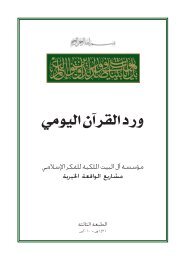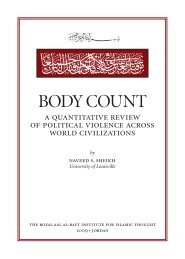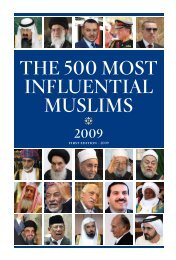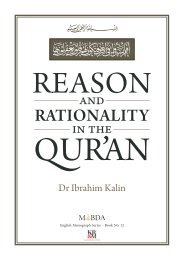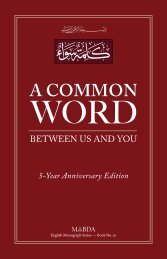Create successful ePaper yourself
Turn your PDF publications into a flip-book with our unique Google optimized e-Paper software.
There are perhaps three reasons why this is so: (1) remembrance<br />
is the easiest of all rites and indeed all acts—all that it requires is<br />
consciousness and will—and therefore it can be practised at all times<br />
and in all circumstances; (2) remembrance is the most basic and<br />
direct of all rites since it involves thought and therefore the soul<br />
itself; and (3) remembrance does not involve an ordinary object of<br />
thought or an ordinary word (like ‘tree’ or ‘mountain’), but rather<br />
God Himself as the Object of thought47 through a word or a sacred<br />
the presence of these things are equal to you. Then you isolate yourself in a private<br />
corner [somewhere] and limit your acts of worship to the obligatory prayers and<br />
to the established supererogatory prayers (rawatib), and you sit, empty of heart,<br />
concentrating your attention, preparing to draw near to God Most High, through<br />
your remembrance of Him.<br />
This is at the beginning of the matter: you persist in remembering God Most High<br />
with your tongue, such that you do not stop saying: “<strong>Al</strong>lah”, “<strong>Al</strong>lah” with presence<br />
of heart and full consciousness until you reach a state in which, if you were to stop<br />
moving your tongue, you would find it as if still invoking the word [‘<strong>Al</strong>lah’], because<br />
it has grown so accustomed to it. Still you endure patiently doing that, until the<br />
role of your tongue is gone but your soul and heart continue invoking without your<br />
tongue moving. Then you persist until nothing remains in your heart except the<br />
meaning of the word [‘<strong>Al</strong>lah’], and your mind does not think of the letters or form<br />
of the word [‘<strong>Al</strong>lah’]—only purely the meaning, present in your heart, necessarily<br />
and at all times.<br />
You can choose things only up to this point. After this you have no control, except<br />
in continuing to repel distracting thoughts. Then you lose your power of choice,<br />
and nothing remains for you except to wait and see what happens to you by way<br />
of ‘spiritual openings’ [‘futuh’], like what happens to the saints (and which are<br />
actually only a mere part of what happens to the Prophets). It may be something<br />
like a passing lightning bolt that does not last; then it <strong>com</strong>es back. But it may<br />
delay, yet if it <strong>com</strong>es back then it may stay, and stabilize [in you]. If it stays, it may<br />
stay for a long time, or perhaps just a short period. Or it may happen in succession.<br />
And there may be different varieties. The stations of the saints are countless, in<br />
accordance with their different natures and virtues. That is the method of Sufism;<br />
it has been summarized as <strong>com</strong>plete purification on your behalf, along with serenity<br />
and clarity; and then preparedness and waiting, only. (Abu Hamid <strong>Al</strong>-Ghazali,<br />
Mizan al-‘Amal, ed. Dr. Sulayman Dunya, Dar <strong>Al</strong>-Ma’rifa, Egypt, 1964, p.222–223<br />
[trans. Ghazi bin Muhammad].)<br />
47 If a person were to merely repeat to themselves a word like ‘goodness’ constantly for<br />
long periods of time, there would no doubt be some psychological effects through ‘autosuggestion’<br />
or a kind of ‘self-hypnosis’—some modern cults do precisely this—but this would<br />
never produce Ihsan or true virtue in a soul because the word ‘goodness’ in English is not<br />
43




